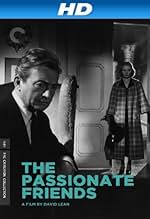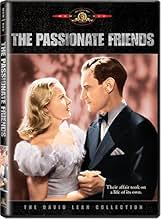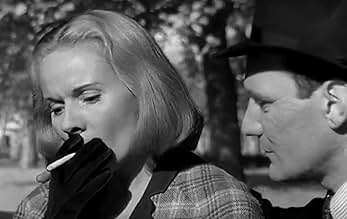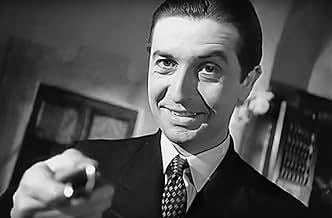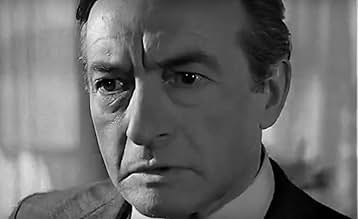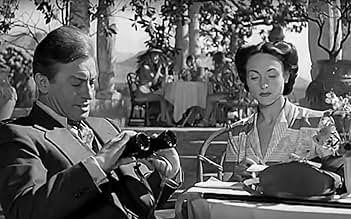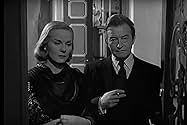AVALIAÇÃO DA IMDb
7,2/10
3,4 mil
SUA AVALIAÇÃO
Uma mulher conhece um homem cujo amor ela rejeitou anos atrás.Uma mulher conhece um homem cujo amor ela rejeitou anos atrás.Uma mulher conhece um homem cujo amor ela rejeitou anos atrás.
- Direção
- Roteiristas
- Artistas
- Prêmios
- 2 vitórias e 1 indicação no total
Hélène Burls
- Flowerwoman
- (não creditado)
Amy Dalby
- Lady on Underground
- (não creditado)
Lisa Daniely
- Cinema Usherette
- (não creditado)
Max Earle
- Third Man - Albert Hall
- (não creditado)
Edward Evans
- Underground ticket officer
- (não creditado)
Arthur Howard
- Smith - Butler
- (não creditado)
John Huson
- First Man - Albert Hall
- (não creditado)
Wilfrid Hyde-White
- Lawyer
- (não creditado)
Charles Lloyd Pack
- Man Drinking with Stratton
- (não creditado)
Guido Lorraine
- Hotel Manager
- (não creditado)
Ina Pelly
- Second Woman - Albert Hall
- (não creditado)
Helen Piers
- First Woman - Albert Hall
- (não creditado)
Marcel Poncin
- Hall Porter
- (não creditado)
Avaliações em destaque
6sol-
A rather early entry in David Lean's career, his directing skills show through in some dramatic moments that require intense atmosphere. Nevertheless, the film is not the best example of Lean's abilities - both before and after it he directed superior productions - but this one is still okay viewing. With many flashbacks melded in with the plot, some are better done than others, and likewise, sequences showing the thoughts and dreams of the characters vary in effectiveness. There is a memorable sequence that features multiple telephone tracks, and there are also a few other neat tricks in the mix. The cinematography is quite good, and the cast keeps the film at an interesting level. Still, it is primarily of interest to followers of Lean's work.
This Rank/Cineguild production directed by David Lean is based on a novel by H G Wells, here adapted by Lean and Stanley Haynes, though with a screenplay credited to Eric Ambler. Although the plot is about a triangle, Lean's focus is on Ann Todd as the woman between two men, her husband and the man who was her first love but whom she refused to marry. Her situation is presented in an exchange between the man, Trevor Howard and Todd - "If two people really love each other they want to be together. They want to belong to each other", Todd - "I want to belong to myself", "Then your life will be a failure". However in the tradition of upper class Brits, Todd's life of failure means a marriage to a successful banker, Claude Rains. The narrative has an unusual triple flashback structure, which is perhaps why it needed three writers, with the present being narrated by Todd with the prospect of a divorce, and flashbacks to the vacation in Switzerland where the instigating incident occurs, Todd's memory/flashback of 9 years earlier re-meeting Howard, and small memories of their first romance. The initial meeting is tainted by lines like Todd's "Why can't we be in love without the clutching and gripping", though later Todd admits to "not being a very good person". Howard's character has his ambiguities too, being a university biology lecturer who knowingly has an affair with a married woman. The infidelity gets a funny spin by Rains' business with Germany and Italy pre-WW2, and Rains saying he has "a taste for intrigue", though the film being made post-WW2 allows him to speak of the "Teutonic hysteria" of the Germans. In spite of some of Lean's technical touches, the thing that de-passionates the situation is Todd, in her first film for her then husband. Whilst at times she resembles Garbo, the rather butch Todd lacks the divine one's expressiveness, with Lean reduced to filming her running from Howard in slow motion to give her some lyricism. All three of the leads are oddly lit indelicately, perhaps to suggest that all this passage of time has aged them, but this with Todd, adds to the destruction of romantic intent. Lean provides a vocal montage of telephone conversations, cuts from a kiss to a bunch of flowers, doors slamming to a typewriter slide of the divorce document, gives Rains a cuckold paranoid montage, and has a "Keep Smiling" poster featured in the background of the climactic scene in the train underground, though the idea of Todd not buying a ticket before she enters rather pre-empts things. Rains has the audience empathy, even if the odd way he stand in a ¾ pose when he confronts someone seems silly. He is the more emotional of the three, but because of the British standards of polite behaviour, his yells are either heard off-camera or with his back to us. The best scene reads as Hitchcock-influenced with Rains dictating to his secretary and Lean continually cutting to a pair of tickets to a play Todd and Howard go to see. The title First Love gets a comic payoff when we hear it is a musical with a fatuous title song.
It's easy to associate "The Passionate Friends" to its detriment with "Brief Encounter"; in its voice-over/flashback structure, in its themes of suicide and adultery, and of course in the casting of Trevor Howard. But in a sense -- although not, unfortunately, an entirely successful one -- in a sense, the later film is an attempt to do something very different with this source material. At the most basic level the two pictures have virtually nothing in common: "Brief Encounter" is a story of renunciation and unselfishness, of ordinary lives in an unromantic setting, of heartbreak from a painfully honest narrator. "The Passionate Friends" (a title never really explained) revolves ultimately around selfishness and self-deception, lavish trappings and a shallow surface gloss epitomised by the cheesy 'Swiss' tourist music that backs the initial establishing shots.
Mary's swelling soft-focus memories of her grand passion are deflated by jarring little jabs from the director, in what I suspect is intended as an alert to the viewer that her romantic-seeming situation is not quite what it seems -- in effect, she is an unreliable narrator, and the pay-off comes when she perceives, finally and appallingly, what she really is and what she has done. It is a climax worth waiting for, but it is slow to arrive; and the subtle wrongness in the love affair, the self-dramatisation and lack of authenticity (whether or not these are deliberate attempts to undermine her presentation of events, as hindsight suggests they may be) until then tend to come across simply as unconvincing story-telling.
It is never clear just what Mary means by her assertion that she wants to belong to herself and not to any lover. By the end, however, it is all too apparent that this mantra, reminiscent of the "Can't tie me down, babe" slogans of the (male) serial shaggers of the Sixties, is every bit as self-indulgent a female pose. She is in love with the idea of being in love: playing at it, day-dreaming transgressions. But when reality strikes, the whole game is exposed as a silly, hugely destructive fantasy.
After the first showdown with her husband (which we are specifically, and with hindsight, significantly, not allowed to witness), she warns Steven that she is not truly a good person to love. We -- and he -- do not then either understand or believe her; but she is right. She is not prepared to give herself, in modern parlance to 'commit': but she will not let go either.
The trouble for me is that for most of its running length the film seems to be simply a somewhat off-kilter account of an adulterous affair, over-ponderous, with clumsy use of music and heavily ironic dialogue. (The cinema audience, young and out for a good time, spent rather more time giggling than I assume the director intended.) The cinematic tricks that are present, such as the abrupt cuts in the taxi scene, the nested flashback structure, or the montage of advertisements in the Tube station reading "Keep Smiling", "Strength" and "Saved", too often seem awkward or labouring the obvious. If the idea was indeed to subtly undermine audience preconceptions, it doesn't really work -- there is no equivalent here to the stunning shift in perception that exists between the opening sequence of "Brief Encounter" and the final unwinding of the flashback.
As the ambiguous Mary, Ann Todd is a strangely elusive presence. The character is at the heart of the plot and has the lion's share of screen time, and yet most of that time it's hard to get a grip on her beyond the superficial. I'm still not sure whether this is an intended result of the acting and/or direction, or a flaw in the film.
Trevor Howard carries off the role of the unfortunate Steven with angular charm and provides the requisite sense of bewildered decency; but as others have rightly remarked, it is Claude Rains, in what might appear a largely peripheral role, who steals the show. Rich, older, physically unprepossessing, and mildly affectionate towards his wife when he can spare a moment from the financial markets, Howard Justin is the face of moneyed security versus the romantic passion promised by Mary's once-and-future lover, and as such represents the trappings of a marriage of convenience rather than an actual human being. But almost from the beginning we are made aware that he is neither unintelligent nor unobservant; later we discover that he is not as complaisant as the other couple have assumed, and finally, that he can be hurt -- and can love -- as deeply as any other man. Over a mere handful of scenes in the course of the film Claude Rains manages to convey more tension and real emotional presence than anyone else, and it is this contribution that makes the final twist both plausible and satisfying.
"The Passionate Friends" is not the great film that I feel it is perhaps trying to be; but it is certainly not an abortive carbon-copy of "Brief Encounter". The resolution of the film is starkly effective and is worth sitting through a glossy and rather uninspired beginning for: as a whole, it can be seen as an honourable failure.
(Edit: for what it's worth, in the month since I saw this film I haven't been able to get it out of my head...)
Mary's swelling soft-focus memories of her grand passion are deflated by jarring little jabs from the director, in what I suspect is intended as an alert to the viewer that her romantic-seeming situation is not quite what it seems -- in effect, she is an unreliable narrator, and the pay-off comes when she perceives, finally and appallingly, what she really is and what she has done. It is a climax worth waiting for, but it is slow to arrive; and the subtle wrongness in the love affair, the self-dramatisation and lack of authenticity (whether or not these are deliberate attempts to undermine her presentation of events, as hindsight suggests they may be) until then tend to come across simply as unconvincing story-telling.
It is never clear just what Mary means by her assertion that she wants to belong to herself and not to any lover. By the end, however, it is all too apparent that this mantra, reminiscent of the "Can't tie me down, babe" slogans of the (male) serial shaggers of the Sixties, is every bit as self-indulgent a female pose. She is in love with the idea of being in love: playing at it, day-dreaming transgressions. But when reality strikes, the whole game is exposed as a silly, hugely destructive fantasy.
After the first showdown with her husband (which we are specifically, and with hindsight, significantly, not allowed to witness), she warns Steven that she is not truly a good person to love. We -- and he -- do not then either understand or believe her; but she is right. She is not prepared to give herself, in modern parlance to 'commit': but she will not let go either.
The trouble for me is that for most of its running length the film seems to be simply a somewhat off-kilter account of an adulterous affair, over-ponderous, with clumsy use of music and heavily ironic dialogue. (The cinema audience, young and out for a good time, spent rather more time giggling than I assume the director intended.) The cinematic tricks that are present, such as the abrupt cuts in the taxi scene, the nested flashback structure, or the montage of advertisements in the Tube station reading "Keep Smiling", "Strength" and "Saved", too often seem awkward or labouring the obvious. If the idea was indeed to subtly undermine audience preconceptions, it doesn't really work -- there is no equivalent here to the stunning shift in perception that exists between the opening sequence of "Brief Encounter" and the final unwinding of the flashback.
As the ambiguous Mary, Ann Todd is a strangely elusive presence. The character is at the heart of the plot and has the lion's share of screen time, and yet most of that time it's hard to get a grip on her beyond the superficial. I'm still not sure whether this is an intended result of the acting and/or direction, or a flaw in the film.
Trevor Howard carries off the role of the unfortunate Steven with angular charm and provides the requisite sense of bewildered decency; but as others have rightly remarked, it is Claude Rains, in what might appear a largely peripheral role, who steals the show. Rich, older, physically unprepossessing, and mildly affectionate towards his wife when he can spare a moment from the financial markets, Howard Justin is the face of moneyed security versus the romantic passion promised by Mary's once-and-future lover, and as such represents the trappings of a marriage of convenience rather than an actual human being. But almost from the beginning we are made aware that he is neither unintelligent nor unobservant; later we discover that he is not as complaisant as the other couple have assumed, and finally, that he can be hurt -- and can love -- as deeply as any other man. Over a mere handful of scenes in the course of the film Claude Rains manages to convey more tension and real emotional presence than anyone else, and it is this contribution that makes the final twist both plausible and satisfying.
"The Passionate Friends" is not the great film that I feel it is perhaps trying to be; but it is certainly not an abortive carbon-copy of "Brief Encounter". The resolution of the film is starkly effective and is worth sitting through a glossy and rather uninspired beginning for: as a whole, it can be seen as an honourable failure.
(Edit: for what it's worth, in the month since I saw this film I haven't been able to get it out of my head...)
The Passionate Friends is the first of three films that director David Lean made with Ann Todd in and she gives a fine performance in this mannered British melodrama that evokes in ways two other popular British films of the era, Lean's Brief Encounter and the Todd starring The Seventh Veil.
Former lovers Mary Justin (Todd) and Steven Stratton (Trevor Howard) meet accidentally at a New year's party and rekindle lost feelings. Trouble is she is married to a wealthy banker Howard Justin (Claude Rains) and Stratton's in a committed relationship. Justin discovers the affair however and puts an end to it. Nine years pass and they meet again while vacationing. Stratton is now married with kids but Howard thinks otherwise and files for divorce. Mary becomes desperate and suicidal.
With quality performances (especially Rains) from all of the leads The Passionate Friends is credible melodrama that overachieves with Lean displaying his superb grasp of film language, employing jump cuts, montage and juxtaposition for maximum effect. With a few Hitchcock like flourishes along the way he does an excellent job of keeping the audience guessing right up until the final minutes. It is this subtle triumph of form that makes The Passionate Friends a superior example of its genre.
Former lovers Mary Justin (Todd) and Steven Stratton (Trevor Howard) meet accidentally at a New year's party and rekindle lost feelings. Trouble is she is married to a wealthy banker Howard Justin (Claude Rains) and Stratton's in a committed relationship. Justin discovers the affair however and puts an end to it. Nine years pass and they meet again while vacationing. Stratton is now married with kids but Howard thinks otherwise and files for divorce. Mary becomes desperate and suicidal.
With quality performances (especially Rains) from all of the leads The Passionate Friends is credible melodrama that overachieves with Lean displaying his superb grasp of film language, employing jump cuts, montage and juxtaposition for maximum effect. With a few Hitchcock like flourishes along the way he does an excellent job of keeping the audience guessing right up until the final minutes. It is this subtle triumph of form that makes The Passionate Friends a superior example of its genre.
I was surprised to learn that the original story for The Passionate Friends was written by H.G. Wells. Someone nowadays we identify with the science fiction genre. Certainly it seems to be what has survived best in English literature.
The original story was written in 1913 so some considerable updating was done to make it 1949 contemporary. Lovers Ann Todd and Trevor Howard had an affair back in the day which was ended when Todd's husband Claude Rains found out.
Eleven years go by and Todd and Howard meet at a mountain ski resort in Switzerland. Howard's now married and moved on, but they spend an innocent afternoon reminiscing. Rains catches them and misinterprets with near tragic results.
Ann Todd may be one of the most beautiful women ever to grace the silver screen. She's probably best known in America for being Gregory Peck's loyal wife in The Paradine Case. No wonder Rains is so jealous.
Trevor Howard is essentially doing the same part for David Lean that first got him stardom in Brief Encounter. In fact the story could almost be what happens to the protagonists in Brief Encounter if they met up again in the future. Claude Rains is always right on the money with his portrayals. There's a lot of what John Barrymore did in Maytime in what Rains does here.
If it were done here in the USA, this would have been labeled a woman's picture. It is in fact a nicely done romantic story.
The original story was written in 1913 so some considerable updating was done to make it 1949 contemporary. Lovers Ann Todd and Trevor Howard had an affair back in the day which was ended when Todd's husband Claude Rains found out.
Eleven years go by and Todd and Howard meet at a mountain ski resort in Switzerland. Howard's now married and moved on, but they spend an innocent afternoon reminiscing. Rains catches them and misinterprets with near tragic results.
Ann Todd may be one of the most beautiful women ever to grace the silver screen. She's probably best known in America for being Gregory Peck's loyal wife in The Paradine Case. No wonder Rains is so jealous.
Trevor Howard is essentially doing the same part for David Lean that first got him stardom in Brief Encounter. In fact the story could almost be what happens to the protagonists in Brief Encounter if they met up again in the future. Claude Rains is always right on the money with his portrayals. There's a lot of what John Barrymore did in Maytime in what Rains does here.
If it were done here in the USA, this would have been labeled a woman's picture. It is in fact a nicely done romantic story.
Você sabia?
- CuriosidadesThis movie is based on the 1913 novel "The Passionate Friends" by H. G. Wells, who also wrote "The Invisible Man", which was made into a 1933 hit movie starring Claude Rains, one of the stars in this movie.
- Erros de gravaçãoWhen Steven barges into Howard's office, he is shown starting to close the door, followed by the sound of a door closing. However, in the subsequent shot, the door is open again.
- Citações
Mary Justin: I'm not a very good person, Steven. I wanted your love - and I wanted Howard's affection and the security he could give me.
Professor Steven Stratton: I can give you security too, and more than affection.
Mary Justin: You don't really know me at all. My love isn't worth very much.
- ConexõesFeatured in Discovering Film: Claude Rains (2015)
Principais escolhas
Faça login para avaliar e ver a lista de recomendações personalizadas
- How long is The Passionate Friends?Fornecido pela Alexa
Detalhes
- Data de lançamento
- País de origem
- Idiomas
- Também conhecido como
- Apasionada
- Locações de filme
- Le Brévent, Chamonix, Haute-Savoie, França(cable car outing at Brévent in front of Pic du Midi)
- Empresa de produção
- Consulte mais créditos da empresa na IMDbPro
Bilheteria
- Faturamento bruto mundial
- US$ 40.335
- Tempo de duração1 hora 35 minutos
- Cor
- Proporção
- 1.37 : 1
Contribua para esta página
Sugerir uma alteração ou adicionar conteúdo ausente

Principal brecha
By what name was A História de uma Mulher (1949) officially released in India in English?
Responda

